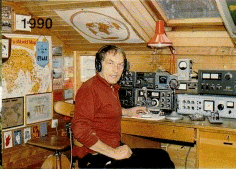What is ham radio?
Ham radio operators belong to a group of people having special interest in wireless communication technology. People from all the spheres of life are found among the ham radio operators who operate their wireless transceivers (a combined unit of radio transmitter and receiver) during their pastime for the cheer joy, thrill and excitement involved in doing worldwide radio communication. Unlike the broadcast radio stations (to whom we tune our radio receivers to listen to), ham radio is a two-way communication system. Ham radio
 operators can put their voice
on-the-air to be listened into and at the same time replied back by their fellow radio
operators (many of them are ardent radio experimenters) around the world. It is an
exciting way to discover new friends and disseminate knowledge on-the-air. While some hams
like to fiddle with the homemade wireless equipment, modifying it on a continuous basis to
improve its performance, there are others who prefer to buy factory made equipment. One
interesting fact about ham radio communication is that hams don’t have to pay any
money to the authority for their on-the-air conversation! The fraternity of ham radio
operators evolved back in the early part of the twentieth century following the footsteps
of great radio scientists like the Italian Guglielmo Marconi and the Indian Sir Jagdish Chandra
Bose. With the availability of low
cost easily replicable circuits of radio transmitters and receivers, the number of ham
radio operators increased to millions. In-fact the growth of electronics communication
technology is going hand in hand with the progress of ham radio. Nowadays, there are
millions of them who prefer readymade professionally built equipment instead of the home
made ones. In fact, the advancement in the field of electronics and the flourishing growth
of electronics industry in countries like Japan has been attributed to the presence of
large group of dedicated ham radio operators (to the tune of 13,50,127). Though ham radio
is a highly specialized technical hobby, it requires no special qualification (except that
the person going to be a ham has attained 12 years of age). The only thing it requires is
an interest in radio communication and sufficient enthusiasm to find reason to operate a
radio station of your own, because ham radio, also known as "Amateur Radio" does
not provide you pecuniary gain. What you gain from being a ham is more than what money can
give and for that you got to be imaginative!
operators can put their voice
on-the-air to be listened into and at the same time replied back by their fellow radio
operators (many of them are ardent radio experimenters) around the world. It is an
exciting way to discover new friends and disseminate knowledge on-the-air. While some hams
like to fiddle with the homemade wireless equipment, modifying it on a continuous basis to
improve its performance, there are others who prefer to buy factory made equipment. One
interesting fact about ham radio communication is that hams don’t have to pay any
money to the authority for their on-the-air conversation! The fraternity of ham radio
operators evolved back in the early part of the twentieth century following the footsteps
of great radio scientists like the Italian Guglielmo Marconi and the Indian Sir Jagdish Chandra
Bose. With the availability of low
cost easily replicable circuits of radio transmitters and receivers, the number of ham
radio operators increased to millions. In-fact the growth of electronics communication
technology is going hand in hand with the progress of ham radio. Nowadays, there are
millions of them who prefer readymade professionally built equipment instead of the home
made ones. In fact, the advancement in the field of electronics and the flourishing growth
of electronics industry in countries like Japan has been attributed to the presence of
large group of dedicated ham radio operators (to the tune of 13,50,127). Though ham radio
is a highly specialized technical hobby, it requires no special qualification (except that
the person going to be a ham has attained 12 years of age). The only thing it requires is
an interest in radio communication and sufficient enthusiasm to find reason to operate a
radio station of your own, because ham radio, also known as "Amateur Radio" does
not provide you pecuniary gain. What you gain from being a ham is more than what money can
give and for that you got to be imaginative!Definitions BACK TO MY HOMEPAGE